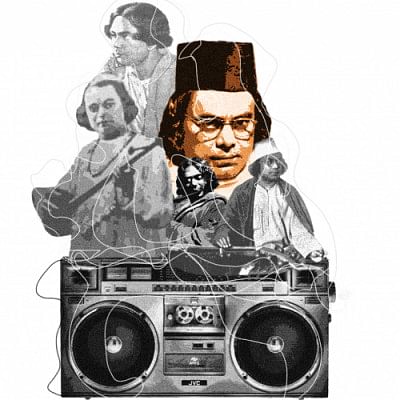‘Khandito Nazrul’: Why he is and should be relevant

"Scheherazade from Arabian Nights had more time than I have today, you know?" The moderator Manmay Zafar, who is Associate Professor of English at Jahangirnagar University, started the 10th Dhaka Lit Fest's session on Kazi Nazrul Islam with a joke about the small amount of time he could allow each speaker. But the 15 minutes each of the speakers got on January 6, Day 2 of the DLF, were enough for the audience to discover Nazrul in new lights.
Singer and translator Nashid Kamal talked about how Nazrul's creations have vastly influenced her life. In addition to her family connections with Nazrul, she has felt obliged to carry his legacy because she discovered all the ways his literary endeavours attempted to remove enmity from society. By using a wide range of references from different religions and bringing together various religious diction within the same line, Nazrul created a bridge between distinct groups. However, as Nashid Kamal explained, this has also made it challenging to translate Nazrul. His words have diverse connotations, making it complicated to find equivalent vocabulary for them in other languages.
Rachel McDermott, Professor of Asian and Middle Eastern Cultures at Barnard College, added to the discussion, specifying factors that made it difficult for the study of 'khandita Nazrul' to rise in the west.
The difficulty of translation is one of the reasons why he is not discussed as extensively as Tagore in the west, she explained. She, too, agreed that Nazrul is difficult to translate because of not only the references from other languages, but grammatical issues as well. Yet the study of Nazrul has been flourishing in recent times, and the credit goes to the encouragement from Bangladesh, she expressed.
Though McDermott herself admitted that her main interest lies in Nazrul's Shyama-sangeet, she pointed out the problem with his selective acceptance. "Nazrul has become 'khandito'", she said—the perception of Nazrul changes depending on the geopolitical location. Some consider him to be Islamic, while some see him as a secular poet. Just one example is how a particular type of songs by the national poet was popular in Bangladesh when she first started studying his work, while in India, it was mainly the Shyama Sangeet that were widely appreciated.
In her years of research on Nazrul, Professor McDermott has found that this attempt to divide Nazrul has always been there. The elites attempted to forge him into one Pakistan. There was an apparent attempt to de-Hinduise him. His works focusing on 'Hindu ideas', or works that brought Hindus and Muslims together, were rejected by many publishers. In some cases, certain words were changed to allow the diction to satisfy Islamic sentiments. Although Nazrul could save his works from the influence of political pollution during the time when he was active, he couldn't preserve the essential integrities and authenticity after he became a 'blank slate' in the later period, she explained.
Fortunately, nothing could prevent his essence from surviving these attempts. Winston E Langley, journalist and Emeritus Professor of Political Science and International Relations at the University of Massachusetts Boston, pointed out that Nazrul is "one of the greatest advocates of human rights among poets", and this will keep him alive forever. Nazrul's emphasis on self-identity, spirituality, and optimism has secured him a permanent place in society. Professor Langley agreed that Nazrul is not as widely known as he ought to be, but he believes this is changing. As evidence to support this claim, he mentioned that Hammarskjold High School, a cosmopolitan high school in Canada, has Nazrul in their curriculum. This is a hint that the study of his work in the west has already begun and will flourish in the future.
Professor Langley has noticed interesting similarities between Nazrul and some revered western figures. What Nazrul and Robert Burns, the national poet of Scotland, have in common is comparable backgrounds, meagre lifestyles, and a tendency to use local language rather than following the established norm. Most importantly, both their contemporary academic elites rejected them.
Nazrul was a religious existentialist, Professor Langley pointed out, comparable with Søren Kierkegaard. He also compared Nazrul to Neruda for their affinity for ordinary objects and ordinary people. In addition, he explained that Nazrul can be found in Abdulrazak Gurnah's novel, Paradise.
A brief Q&A session after the discussion was followed by Nashid Kamal's short yet mellifluously astounding performance of one of the famous Nazrul songs, "Laili tomar eshechhe firia."
This session offered an extensive understanding of why Nazrul is essential, necessary, and relevant. As moderator Manmay Zafar explained, not only will Nazrul forever be relevant, we need him to be relevant in our society because where there lies diversity, advocacy of unity is essential.
Abdullah Rayhan is studying English Literature at Jahangirnagar University.

 For all latest news, follow The Daily Star's Google News channel.
For all latest news, follow The Daily Star's Google News channel. 











Comments